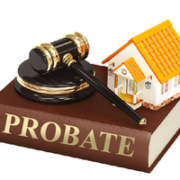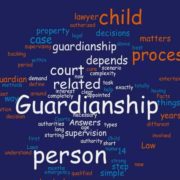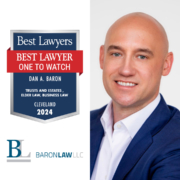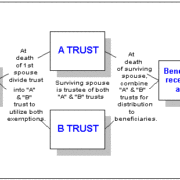Probate Is Expensive And Time-Consuming. Here Are Ways To Avoid Probate
Cleveland, Ohio, estate planning law firm, Baron Law LLC, Cleveland, Ohio, offers the following information on you can avoid probate when you are thinking of establishing your comprehensive estate plan.
All too often people draft a last will and testament, shove the document in a safety deposit box at the local bank, and never give it another thought. Granted, a cavalier attitude towards one’s estate plan is a bold strategy but at best it’s costing thousands of dollars down the line, at worst the will isn’t worth the paper it’s printed on and the surviving family is left the deal with a tangled mess of who gets what. A comprehensive estate plan drafted by competent counsel will cost is a little now but save you a lot later.
A last will and testament is primarily meant to memorialize instructions for the distribution of assets, obligations, and wealth when someone dies. The process in which a will is read, followed, and, if necessary, contested is called probate. This process also applies if someone dies intestate, that is, without a will, but state law is followed instead of explicit instructions given in a will. Probate isn’t a necessarily evil process but it is labor intensive and costly. Probate is a legal process undertaken in state court under the watchful gaze of the assigned probate judge. As such, probate often takes many months to complete during which court costs continue to accrue. Even after a moderate probate process, probate costs can reach as much as 10% of the gross estate. Money better spent on more pressing concerns like funeral expenses or lingering medical costs. Further, during probate, beneficiaries don’t have access to the property bequeathed to them until probate is finished, regardless of whether the will is contested or not.
Since everyone prefers to preserve the most amount of assets to leave to surviving friends and family and provide access to such assets quickly, avoiding probate whenever possible is advantageous. Below are the most common ways probate is avoided.
Beneficiary Designations
Some major assets such as life insurance policies and retirement accounts, like IRAs and 401(k)s, are inherently outside of probate due to their mandated beneficiary designations. The owner of these assets at creation is required to denote primary and contingent beneficiaries in the event of death. Thus, these assets transfer directly and immediately to listed beneficiaries without the need of court intervention.
Though not as straight forward as simple beneficiary designations, other assets such as bank accounts and non-retirement investment accounts can utilize payable-on-death or transfer-on-death beneficiary designations. To enable payable-on-death beneficiary designations for bank accounts or transfer-on-death beneficiary designations for non-retirement investment accounts, contact the relevant brokerage firm or bank and request the standardized forms. Such designations are becoming more common, as such, all major financial institutions have standardized forms available upon request. The major hurdle is actually requesting the forms, completing them properly, then returning them to the institution. Retaining a local Cleveland area estate attorney can guarantee these forms are completed timely, properly, and in the correct circumstances.
For real estate, Ohio uses transfer-on-death designation affidavits as an avenue to avoid probate. Since 2009, real estate can transfer outside of probate if an affidavit is drafted with the following:
- It describes the property and denotes its instrument number.
- It describes the portion of property subject to transfer.
- It denotes whether the owner is married. If married, the spouse must sign as well.
- It names one or more beneficiary.
- It is signed, notarized, and filed before the death of the owner.
Beneficiary designations serve as explicit instructions regarding transfer of ownership upon death. Probate fundamentally exists to ensure a decedent’s assets go where the decedent wanted them to. So, if a decedent left explicit instructions in the form of beneficiary designations, there is little reason to subject the applicable asset to probate.
Joint Ownership
Joint property by its very nature avoids probate. Joint property, for example, joint and survivor deeds or a joint tenancy with a right of survivorship, passes to the surviving joint owners when one owner dies. The transfer occurs immediately and no probate process is undertaken in regards to the joint asset. This type of ownership is mostly commonly associated with martial homes and assets obtained during marriage. Though marriage is the most common circumstance of joint ownership, it is not exclusive.
Forming a joint ownership relationship is relatively simple in most instances, however, these methods of ownership can present issues regarding trust and control of the property. Namely, there must be mutual trust and confidence between joint owners to upkeep and manage the property. Furthermore, the rights of ownership of joint property depend on the type of joint ownership created. Depending on the type of joint ownership, the use, control, and financial and legal responsibility assigned to each joint owner can vary. Some individuals are uneasy depending upon another to take care of a significant asset. The last thing anyone wants is to get locked into ownership over something expensive with an unstable, lazy, or irresponsible co-owner.
Joint ownership in certain circumstances is practical way to avoid expensive probate costs and lengthy holds on the transfer of ownership in the event of death. There are, however, significant considerations and potential negatives as well. Concerns of concurrent ownership during life may eclipse any probate avoidance benefits down the line. A local Cleveland area estate attorney is in the best position to analyze your estate planning needs and can tell you if joint ownership is advantageous to your situation.
Trusts
Trusts are a commonly recommended estate planning vehicle which affords unparalleled estate planning flexibility. Any quick internet search will illustrate, at length, about the numerous advantages of using trusts during estate planning. Whether looking to avoid probate, control assets pre or post death, or reduce or avoid estate and inheritance taxes, trust utilization is a highly effective option that should always be investigated. Contact a local Cleveland area estate attorney to find out how trusts can benefit you and your family.
A trust, to put it simply, is a private agreement that allows a third party, a trustee, to manage the assets that are placed inside the trust for the benefit of trust beneficiaries. There are innumerable types of trusts, each with own its respective legal conventions and purposes. Within the context of this discussion, however, the critical aspect of trusts is that the assets housed within them usually avoid probate. When the owner of the trust creates the trust and properly funds it, the assets go from the owner’s taxable estate to the trust. Thus, when the owner dies, the assets are not in the owner’s estate and subject to probate. The assets in question pass via the beneficiary designations set down when the trust was created. As mentioned previously, conveyance via beneficiary designation is much simpler, quicker, and cost-effective then the probate process.
The best way to avoid probate and preserve the most amount of money and property for surviving family is situational and based upon individual need and preference. A person may want to avoid probate for Medicaid qualification reasons, privacy concerns, or just to ensure as much money as possible passes to heirs. As such, a visit with a Cleveland area estate planning attorney can the provide proper guidance and evaluation of potential estate planning strategies. An hour with an estate attorney can answer any questions you might have and set you on the path to dealing with some of life’s most critical issues.
For more information, you can contact Mike Benjamin of Baron Law LLC at 216-573-3723. Baron Law LLC is a Cleveland, Ohio area law firm focusing on estate planning and elder law. Mike can also be reached at mike@baronlawcleveland.com.
Helping You and Your Loved Ones Plan for the Future.
About the author: Mike E. Benjamin, Esq.
Mike is a contracted attorney at Baron Law LLC who specializes in civil litigation, estate planning, and probate law. He is a member of the Westshore Bar Association, the Ohio State Bar Association, the Cleveland Metropolitan Bar Association, and the Federal Bar Association for the Northern District of Ohio. He can be reached at mike@baronlawcleveland.com.
















